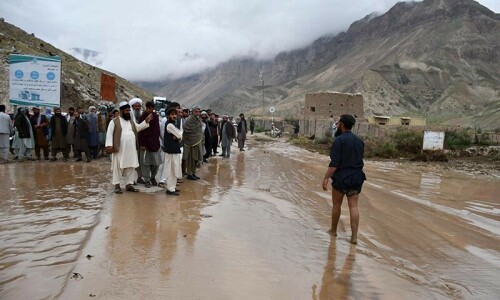• Five leading firms no longer sending vessels via Suez
• US official announces maritime taskforce to protect shipping
DUBAI: Yemen’s Houthi rebels on Monday claimed to have attacked two “Israeli-linked” vessels in the Red Sea – in solidarity with Gaza – as more companies halt transit through the troubled but vital waterway.
The attacks on the Norwegian-owned Swan Atlantic and another ship identified as the MSC Clara, are the latest in a flurry of maritime incidents that are disrupting global trade by increasing delays and raising costs.
Speaking from Israel on Monday, US Defense Secretary Lloyd Austin said a “multinational maritime taskforce” was being set up to protect shipping, and warned Iran to stop supporting the Houthi attacks.
“In the Red Sea, we’re leading a multinational maritime taskforce to uphold the bedrock principle of freedom of navigation. Iran’s support for Houthi attacks on commercial vessels must stop,” he said.
On Saturday, a US destroyer shot down 14 drones in the Red Sea launched from rebel-controlled areas of Yemen, the US military said.
Britain said one of its destroyers had also brought down a suspected attack drone in the area.
Frontline, one of the world’s largest tanker companies, also said it was rerouting ships and would “only allow new business” that could be routed via South Africa’s Cape of Good Hope.
Five of the world’s six top shipping companies have announced they will not send ships through the Red Sea -- MSC, Maersk, CMA CGM, Hapag-Lloyd and Evergreen. On Monday, Britain’s BP said it would suspend transit of oil through the Red Sea, while Cosco, the world’s fourth-largest shipping firm, has yet to announce its plans.
If ships don’t pass through the Red Sea and Suez Canal they need to travel around Africa, which adds considerable time and expense to journeys.
“It might be a six-day-longer journey for the average ship or vessel that will come from Asia going to Europe, and it might cost $300,000-400,000 extra in terms of fuel costs,” said Andreas Krieg, a professor at King’s College London.
Travelling around Africa could “cause a small increase in the price of goods”, said Paul Tourret, head of ISEMAR, a French maritime commerce institute.
The impact would be felt in several months’ time, he said. The delay in shipping could also disrupt supply chains.
Published in Dawn, December 19th, 2023













































Dear visitor, the comments section is undergoing an overhaul and will return soon.